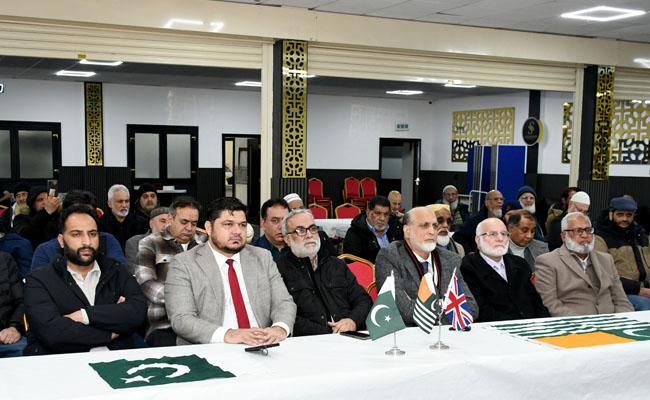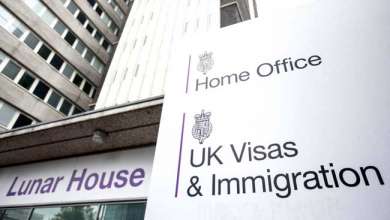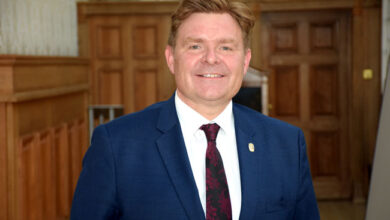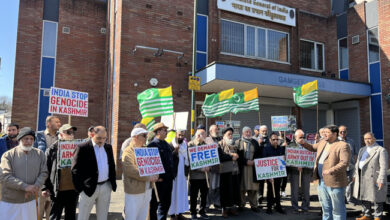Kashmir Solidarity Day Conference Calls for Global Action on Kashmir’s Struggle for Self-Determination

Birmingham, UK – The Kashmir Solidarity Day Conference, organized by the All Parties International Kashmir Coordination Committee (APIKCC), was held in Birmingham with a powerful message of support for the people of Indian-occupied Kashmir, who continue to suffer under what many described as brutal Indian military occupation.
The event brought together a wide range of activists, community leaders, and political figures who voiced their solidarity with Kashmiris and called for stronger international intervention.
The conference was honored by the presence of Professor Dr. Zafar Hussain Zafar, a renowned academician from Azad Jammu and Kashmir (AJK), who served as the chief guest for the event. In his speech, Dr. Zafar emphasized the importance of international advocacy for Kashmir, urging the global community to take a more active role in addressing the ongoing human rights violations in the region.
The conference was presided over by Mr. Fahim Kayani, the President of APIKCC, who is a key figure in the global campaign for Kashmir’s rights. Mr. Kayani’s leadership and vision for a peaceful resolution of the Kashmir issue resonated throughout the event. The event was moderated by Inam ul Haq, Secretary General of APIKCC, who guided the discussions and encouraged dialogue among the diverse group of speakers.
Human rights activists, community leaders, and religious figures who participated in the conference raised alarms about the systematic human rights violations taking place in Kashmir. Speakers highlighted the ongoing violence, including arbitrary detentions, extrajudicial killings, and the suppression of basic freedoms, under India’s military occupation. They also condemned the actions of India’s government under Prime Minister Narendra Modi, accusing him of further exacerbating the situation with policies backed by the extremist RSS (Rashtriya Swayamsevak Sangh) movement.
Human rights organizations have documented a range of atrocities in Kashmir, and several speakers at the conference called on international bodies such as the United Nations and Amnesty International to hold India accountable for its actions. They urged these organizations to ensure justice for the Kashmiri people and put pressure on India to respect international law.
A major theme of the conference was the condemnation of India’s Hindutva agenda under Modi’s leadership, which, according to the speakers, aims to marginalize religious minorities, including Muslims, Sikhs, and Christians. The Kashmir Valley, they argued, is one of the primary victims of this ideology, as it seeks to change the region’s demographics, suppress dissent, and undermine the distinct cultural and religious identity of Kashmiris.
The revocation of Article 370 in August 2019, which stripped Jammu and Kashmir of its special status, was seen as a key move in furthering this Hindutva vision. Speakers at the conference emphasized that the plight of the Kashmiri people is closely linked to this broader extremist agenda, which aims to erase the region’s cultural and religious diversity.
While acknowledging the ongoing struggles of Kashmiris, the conference also served as a platform for urging stronger international action. Speakers collectively called on the global community to hold the Indian government accountable and to press for the implementation of international law to safeguard the rights of Kashmiris. They also demanded that India allow a plebiscite in accordance with United Nations resolutions, so that the Kashmiri people can determine their own future.
Participants also urged Western governments to take a firmer stance on Kashmir, highlighting the rise of Hindutva ideology and the growing humanitarian crisis in the region.
The event concluded with a strong message of solidarity for the people of Kashmir. Organizers and participants reaffirmed their commitment to continuing efforts to raise awareness about the situation in Kashmir and advocate for self-determination for its people.
Mr. Fahim Kayani, President All Parties International Kashmir Coordination Committee in his closing remarks, called for continued mobilization and activism and emphasized the importance of keeping the Kashmir issue at the forefront of global diplomatic discussions. The conference served as a reminder that while the Kashmir issue remains unresolved, the solidarity and determination of those advocating for the region’s freedom remains unwavering.





